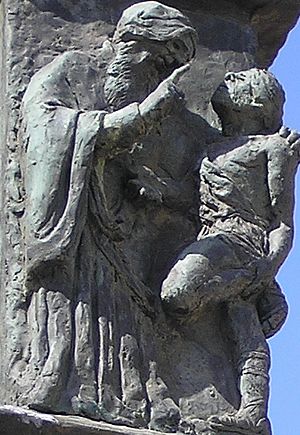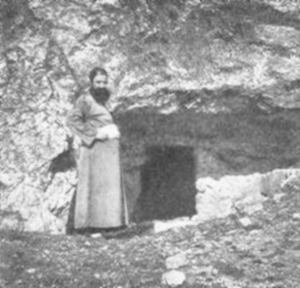Hillel the Elder facts for kids
Quick facts for kids Hillel |
|
|---|---|

Hillel the Elder teaching a man the meaning of the whole Torah while the man stands on one foot (detail from the Knesset Menorah, Jerusalem)
|
|
| Religion | Judaism |
| Personal | |
| Born | Babylon, Parthian Empire |
| Died | Jerusalem, Roman Judea |
Hillel (Hebrew: הִלֵּל Hīllēl) was a very important Jewish religious leader, wise teacher, and scholar. He helped shape the Mishnah and the Talmud, which are key Jewish texts. Hillel also started a famous school called the House of Hillel. He was active around the end of the first century BCE and the beginning of the first century CE.
Hillel is well-known for two important sayings:
- "If I am not for myself, who will be for me? And being for myself, what am I? And if not now, when?"
- "That which is hateful to you, do not do unto your fellow. That is the whole Torah; the rest is the explanation; go and learn."
Contents
Hillel's Life Story
Hillel was born in a place called Babylon. Jewish tradition says he came from important families. His father's side was from the Tribe of Benjamin, and his mother's side was from the family of King David.
Hillel had a brother named Shebna, who was a merchant. But Hillel chose a different path. He worked as a woodcutter while also dedicating himself to studying the Torah.
Hillel lived in Jerusalem during the time of King Herod and the Roman emperor Augustus. Jewish writings compare his life to that of Moses. They say Hillel went to the Land of Israel at age forty. He spent forty years studying and then led the Jewish people for the last part of his life. This means he likely led from about 30 BCE to 10 CE.
When Hillel was about 40 years old, he went to Jerusalem. He wanted to study the Bible and Jewish traditions. The Talmud tells us that Hillel faced many challenges to get into the school of Sh'maya and Abtalion. He also faced many difficulties while studying.
Later, Hillel showed his great wisdom by solving a problem about religious sacrifices. Because of his knowledge, the leaders of the Sanhedrin (a Jewish court), called the Bnei Bathyra, stepped down. They chose Hillel to be the new President. After this, Hillel became the highest authority among the Pharisees. He led a large school, first with Menahem the Essene and later with Shammai. Shammai was another important teacher of Jewish Law.
Hillel had many students. The Jerusalem Talmud says he had eighty pairs of students. The most famous was Jonathan ben Uzziel, and the youngest was Yohanan ben Zakkai.
Hillel used his authority to create new rules. One famous rule was the Prozbul. This rule helped people repay loans even during the Sabbatical year, when debts were usually canceled. This helped both lenders and those who needed money. It was meant to "repair the world" or improve society.
Jewish tradition says Hillel lived to be 120 years old, just like Moses.
Hillel's Famous Sayings
Many of Hillel's teachings are still well-known today. Some scholars believe that a few sayings linked to "Hillel" might have come from later teachers with the same name.
Hillel's teachings often highlight the importance of peace and kindness. He said that people should be humble and patient, like him, and not easily angered like Shammai. There's a story about two men who bet they could make Hillel angry. They asked him insulting questions, but Hillel remained calm and patient.
The Oral Law
A non-Jewish person once asked Shammai how many Torahs there were. Shammai said "two": the written Torah and the Oral Torah. The person didn't believe him. He asked to convert to Judaism only if he had to learn just the written Torah. Shammai sent him away.
The same person then went to Hillel. Hillel converted him and began teaching him. Hillel started by teaching the Hebrew alphabet. The next day, Hillel taught the alphabet backward. The person was confused and said it was different from the day before. Hillel explained that just as you need an oral teaching to learn the written alphabet, you need an oral explanation to understand the written Torah.
The Golden Rule
Another story shows the difference between Shammai and Hillel. A person asked to be taught the entire Torah while standing on one foot. Shammai sent him away.
But Hillel told the person: "What is hateful to you, do not do to your fellow: this is the whole Torah; the rest is the explanation; go and learn." This teaching is often called The Golden Rule. It is similar to the idea in Leviticus 19:18: "Love your fellow as you love yourself."
Taking Care of Yourself and Others
Hillel believed that because humans are created in God's image, we have a duty to care for our bodies. He said that just as we keep statues of a king clean, we must keep our bodies clean. He saw his soul as a guest on Earth, and he had to be kind to it.
Hillel also taught: "If I am not for myself, who is for me? And being for my own self, what am ‘I’? And if not now, when?" This means you must take care of yourself, but also think about others. The last part means you should not delay doing good deeds or studying. He said, "Don't say, 'When I have free time I shall study'; for you may perhaps never have any free time."
Hillel also taught that you should not separate yourself from the community. He said people should not act too differently from others. This shows his love for all people. He also taught that help should be given based on what a poor person truly needs. For example, he once gave a poor man a horse to ride and a servant, so the man could keep his usual lifestyle.
Other Wise Sayings
- "Don't trust yourself until the day you die."
- "Do not judge your fellow until you are in his place."
- "Whoever destroys one soul, it is as though he had destroyed the entire world. And whoever saves a life, it is as though he had saved the entire world."
- "A name gained is a name lost." (This means if you seek fame, you might lose your true self.)
- "Where there are no men, strive to be a man!" (Meaning, if no one else is doing good, you should step up.)
- "My humiliation is my exaltation; my exaltation is my humiliation."
The Importance of Studying Torah
Hillel encouraged many people to learn about the Law. A story tells how Hillel saw people going to work in Jerusalem. He asked them how much they would earn and what they would do with the money. Then he asked, "Would you not rather come and make the Torah your possession, so you can have a good life now and in the future?"
He also warned against neglecting study or using it for selfish reasons. He said, "Whoever would make a name (for himself) loses the name; he who increases not [his knowledge] decreases; whoever learns not is worthy of death; whoever exploits for his own use the crown (of Torah) perishes."
Hillel's Influence on Jewish Law
Not many specific Jewish legal decisions are known by Hillel's name. However, much of the early Jewish law and traditions came from him or his teachers. Hillel created the "seven rules of Hillel." These rules were a way to understand and explain the Torah and Jewish law. They were very important for how Jewish law developed over time.
The House of Hillel vs. The House of Shammai
Hillel's students were known as the "House of Hillel." They often disagreed with the students of Shammai, who were called the "House of Shammai." Their debates covered many parts of Jewish law.
Hillel's Sandwich
During the Passover Seder (a special meal remembering the Jewish people leaving Egypt), people follow old customs. In one part, called Korech, people make a "sandwich." They put bitter herbs between two pieces of matzo (flatbread). They eat it while saying it's a reminder of Hillel.
Hillel used to wrap the Paschal lamb, matzo, and bitter herbs together and eat them. This was to follow a verse from the Bible. Today, since there is no Paschal lamb, people make a sandwich of matzo and bitter herbs. Sometimes, they add charoset, a sweet mix of fruits and nuts.
Hillel in Modern Culture
Hillel's wisdom is so well-known that his ideas appear in popular culture, not just in Judaism.
- Starting in the 1940s, a soap maker named Emanuel Bronner put Hillel's sayings on his product labels. He called them "Rabbi Hillel's Moral ABC."
- In the 1960s TV show Have Gun – Will Travel, the main character, Paladin, often used Hillel's sayings.
- In a 1973 episode of Medical Center, Dr. Gannon also admired Hillel.
- In a 2010 National Public Radio broadcast, the host mentioned Hillel's famous story about teaching the Torah while standing on one foot.
- In the 2018 movie Robin Hood (2018 film), Hillel's phrase "If not now, when?" is repeated many times.
- In the Christian TV show The Chosen, Hillel's phrase "If not now, when?" is a key line. The show also mentions the "School of Hillel" and the "School of Shammai."
See also
 In Spanish: Hilel para niños
In Spanish: Hilel para niños
- Pharisees
- Prozbul
- Simeon ben Hillel
 | James B. Knighten |
 | Azellia White |
 | Willa Brown |


